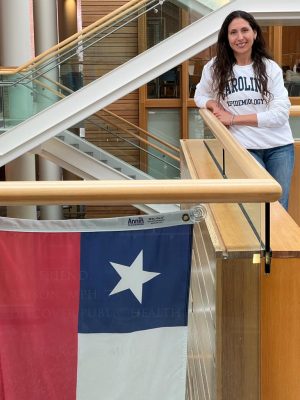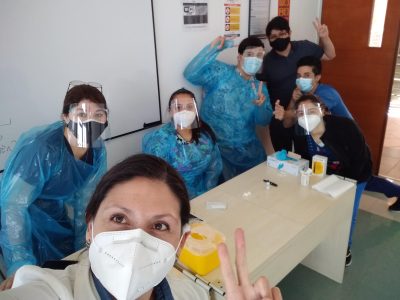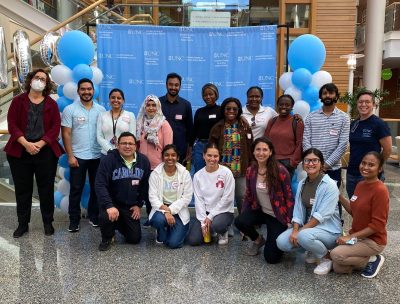Q&A with Paz Cook, MS, PhD in Epidemiology Student
What was your background before enrolling in the PhD program at Gillings?

Paz Cook
My first university studies were in the School of Nursing in Chile, my home country, with a focus on the elderly. When I was in my fifth year, I started working as a research assistant for a research project. It was there that I discovered my curiosity and passion for science, and decided to start my first master’s studies, focused on Nursing, philosophy, and qualitative research. During my second year, I was contacted by one of the most experienced epidemiologists in my country, to coordinate two epidemiological studies related to cancer. I had the opportunity to develop skills in recruitment and follow-up, communication with local communities, conducting research in different socioeconomic settings, working with indigenous groups, such as the Mapuche population in southern Chile, combining traditional Mapuche medicine and the occidental vision of health to achieve the proposed objectives. This was the beginning of my career as a cancer epidemiologist. Two years after, I pursued my second master’s degree, in epidemiology, where I was able to learn the theory after my field knowledge. During this time, I continued working on cancer projects and was able to gain experience coordinating and being a co-researcher of cross-sectional, case-control, longitudinal, and RCT studies, enrolling a total of thirty-five thousand participants in various protocols and developing my skills in research team training and leadership. After twelve years of experience working and studying epidemiology, I felt the need to become an independent researcher, so I decided to apply for a Fulbright scholarship for my doctoral studies. When I found out that I had won it, I was happy and scared at the same time, because I knew that this would be the first step to change 100% my life living in Chile until that moment and the beginning of my PhD journey. Once the funding was secured, I applied and was selected to study at my dream school, Gillings!
Will you tell us more details about your research/work focused on cancer?

Paz with colleagues
My main research interest is cancer screening and early detection in underserved populations. In particular, I am interested in identifying non-invasive mechanisms to select people at higher cancer risk and prioritize diagnostic procedures in them. Too often, patients with totally different cancer risks are waiting for the same procedure without any prioritization. For example, on the same waiting list, there are people waiting for upper endoscopy with suspected symptomatic helicobacter pylori infection and others with suspected cancer. This has the consequence that people who are actually experiencing a cancer process remain on the waiting list for months or years, and when they are finally called for procedures, they have already passed away or are at a very advanced stage where no curative treatment is possible. What I want to do is to combine different elements such as biomarkers, clinical and family history, symptoms, etc., to develop algorithms to prioritize and put people at the top of the list at the highest risk. My motivation is that cancer and cancer mortality are extremely related to the social determinants of health. People who do not have the ability to privately pay for procedures are at a great disadvantage to be diagnosed and treated in time to have a chance of survival. I believe that by doing this research I have the opportunity to contribute to reducing these health disparities, especially in Chile and other Latin American countries.
Will you tell us about your GRA role with the UNC School of Nursing (SON) and the PAHO/WHO Collaborating Center?
The UNC School of Nursing was designated as one of the PAHO/WHO Collaborating Centers worldwide focused on nursing and midwifery. A smart, dedicated and enthusiastic team of UNC SON faculty is creating six e-modules based on the six competencies of Nursing Quality and Safety Education. My role is to translate the written materials and interpret the videos into Spanish, but more importantly to make the cultural adaptation of the content, to nursing education and to the diverse health systems of Latin America. Also as GRA of the Office of Global Initiatives, I am very happy to have the opportunity to make interdisciplinary connections with professionals in the School of Nursing and contribute to the diversity of viewpoints by sharing my international background.
What does “global health” mean to you?
Global health for me is about knowing, understanding, accepting, and considering the diverse cosmovision of health and reality across communities, towns, cities, and countries, in order to create realistic, acceptable, and applicable ways to prevent health problems and create public health solutions. I strongly believe that in order to be able to move forward in creating these solutions, the group of people working on research, clinical care, and policymakers from all sectors must be diverse in terms of nationality, culture, language, age, sexual orientation, socioeconomic background, religious beliefs, and political convictions. I think this is the only way to truly understand and serve the most disadvantaged groups to break down health disparities. In my view, the Health in All Policies (HiAP) approach, including people with very diverse backgrounds, is the strategy we must consider as public health leaders in the future.
What has been a highlight of your time at Gillings?

Building community with Gillings international students
Over the past few months, I have been working with two other friends who are also international students at Gillings, trying to help identify and suggest strategies to improve the enrollment and experience of international students at Gillings, with the goal of increasing the diversity of the school. I have been very surprised at how welcomed we are by the school authorities and how willing they are to listen to us and work together. They have been very kind and active in scheduling working meetings with us and giving us the opportunity to lead this process and create community among the international students.
Do you have any unique talents?
I’m not sure I can say it’s a unique talent, but I have a great passion: dancing. I feel that dancing is my way of expressing myself without the interference of brain structures and rationality that we must maintain in academic or work activities. Dancing makes me feel free and happy.
